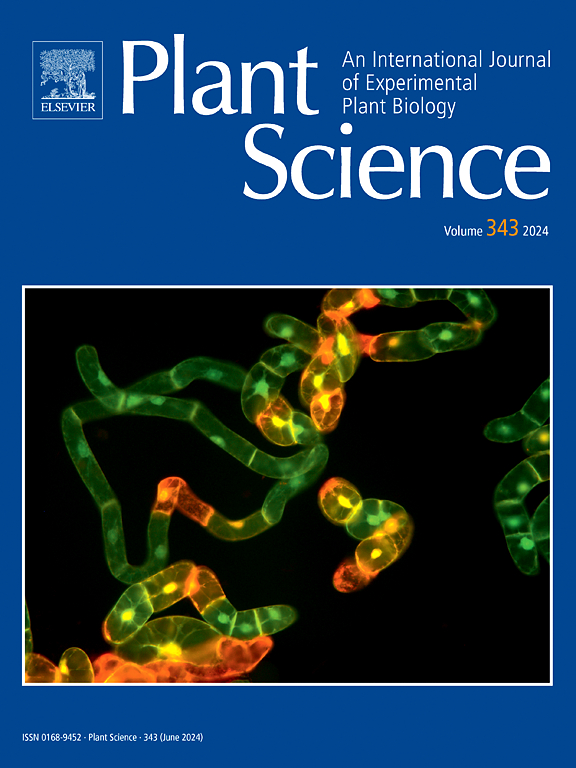Intragenic cytosine methylation modification regulates the response of SUCLα1 to lower temperature in Solanaceae
IF 4.2
2区 生物学
Q2 BIOCHEMISTRY & MOLECULAR BIOLOGY
引用次数: 0
Abstract
The tricarboxylic acid cycle (TCAC) is a fundamental metabolic process governing matter and energy in plant cells, playing an indispensable role. However, its involvement in responding to low temperature stress in potato remains poorly understood. Previous studies have identified succinyl-CoA ligase (SUCL), which catalyzes the phosphorylation of TCAC substrates, as a gene associated with lower temperatures. Nevertheless, its function in potato's response to lower temperatures remains unclear. Phylogenetic analysis has revealed that Solanum tuberosum possesses α and β subunits of SUCL, which cluster with those of Solanum lycopersicum, Nicotiana tabacum and Nicotiana benthamiana. Further investigation has shown that StSUCLα1 is predominantly located within mitochondria. Low temperatures induce methylation modification alterations at 11 intragenic cytosine sites and lead to changes in StSUCLα1 expression levels. Correlation analysis suggests that alterations in intragenic cytosine methylation sites of SUCLα1 may be associated with MET1. Knocking down NbSUCLα1, the homologous gene of StSUCLα1 in N. benthamiana, results in increased susceptibility to low temperature stress in plants. In summary, we have confirmed that SUCLα1 is a key gene modulated by intragenic cytosine methylation in response to lower temperatures, providing a novel target for genetic breeding aimed at enhancing potato tolerance to low temperature stress.
基因内胞嘧啶甲基化修饰调节茄科植物 SUCLα1 对较低温度的响应。
三羧酸循环(TCAC)是植物细胞中管理物质和能量的基本代谢过程,发挥着不可或缺的作用。然而,人们对其在马铃薯应对低温胁迫过程中的参与仍知之甚少。先前的研究发现,催化 TCAC 底物磷酸化的琥珀酰-CoA 连接酶(SUCL)是一种与低温有关的基因。然而,它在马铃薯对较低温度的反应中的功能仍不清楚。系统发育分析表明,Solanum tuberosum具有SUCL的α和β亚基,它们与Solanum lycopersicum、Nicotiana tabacum和Nicotiana benthamiana的SUCL亚基聚集在一起。进一步的研究表明,StSUCLα1 主要位于线粒体内。低温诱导 11 个基因内胞嘧啶位点的甲基化修饰改变,并导致 StSUCLα1 表达水平的变化。相关分析表明,SUCLα1基因内胞嘧啶甲基化位点的改变可能与MET1有关。敲除 N. benthamiana 中 StSUCLα1 的同源基因 NbSUCLα1 会增加植物对低温胁迫的敏感性。总之,我们已经证实 SUCLα1 是一个关键基因,它受基因内胞嘧啶甲基化的调控而对低温做出反应,这为旨在提高马铃薯对低温胁迫耐受性的遗传育种提供了一个新的目标。
本文章由计算机程序翻译,如有差异,请以英文原文为准。
求助全文
约1分钟内获得全文
求助全文
来源期刊

Plant Science
生物-生化与分子生物学
CiteScore
9.10
自引率
1.90%
发文量
322
审稿时长
33 days
期刊介绍:
Plant Science will publish in the minimum of time, research manuscripts as well as commissioned reviews and commentaries recommended by its referees in all areas of experimental plant biology with emphasis in the broad areas of genomics, proteomics, biochemistry (including enzymology), physiology, cell biology, development, genetics, functional plant breeding, systems biology and the interaction of plants with the environment.
Manuscripts for full consideration should be written concisely and essentially as a final report. The main criterion for publication is that the manuscript must contain original and significant insights that lead to a better understanding of fundamental plant biology. Papers centering on plant cell culture should be of interest to a wide audience and methods employed result in a substantial improvement over existing established techniques and approaches. Methods papers are welcome only when the technique(s) described is novel or provides a major advancement of established protocols.
 求助内容:
求助内容: 应助结果提醒方式:
应助结果提醒方式:


